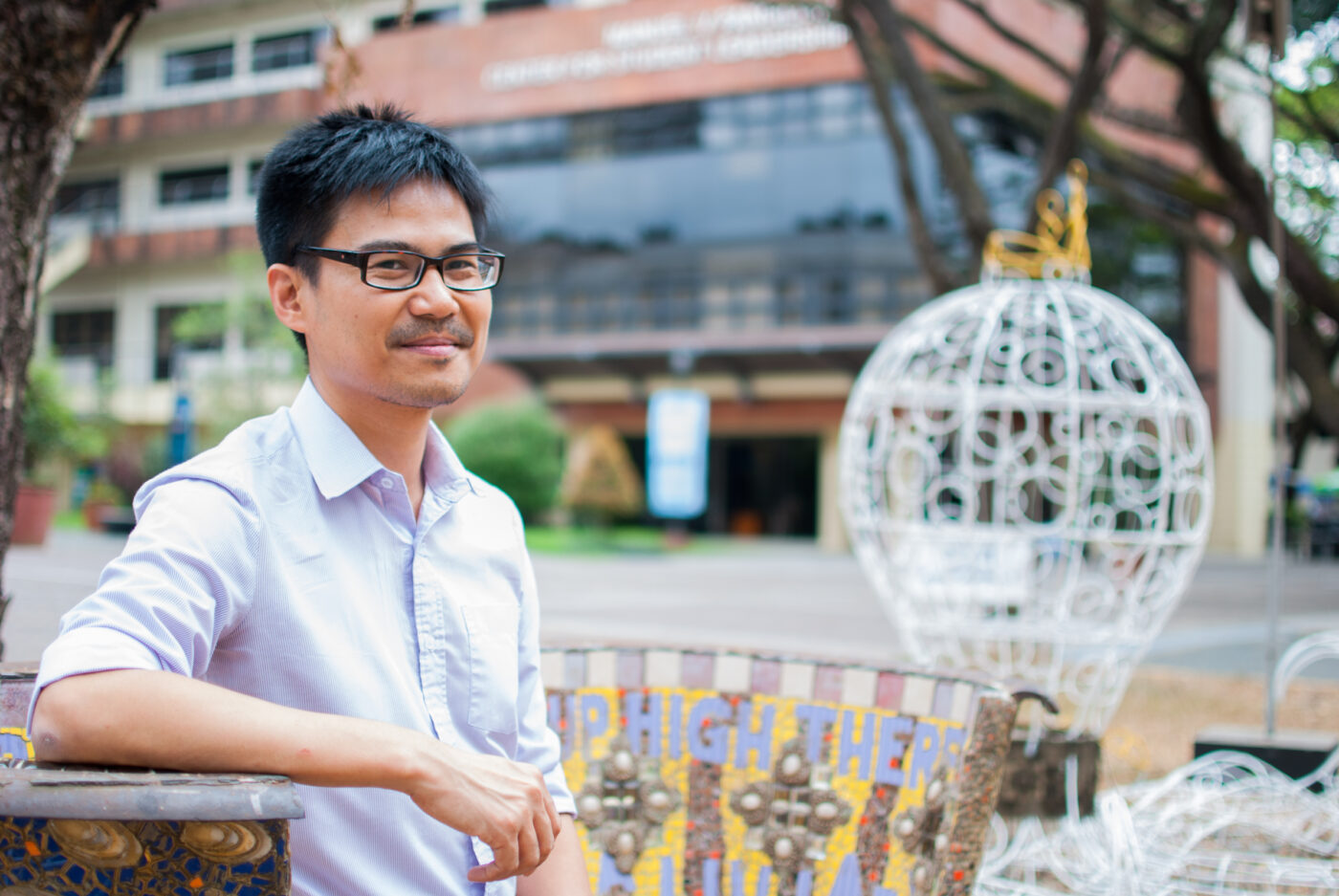There is something enthralling about walking the busy streets of Manila. To an untrained eye, the electrical wires that canopy the city and its clustered buildings are just but ordinary. But for Assistant Professor Vincenz Serrano, PhD of the English Department, the streets of the city he has walked countless times are laden with history and culture, nestling questions that eventually turn into poems.
Fondly called “Snaroe” by his students, Serrano has contributed a handful to the Filipino literary scene. He is the editor-in-chief of Kritika Kultura, an online journal partaking in local and international discourse, and is the recipient of the first prize for the 2009 Don Carlos Palanca Memorial Awards for Literature for his poetry collection The Collapse of What Separates Us, which was then published in 2010.
In addition to these, the recent release of his new poetry collection When a Map Is Folded Cities Come Closer, When Clothes Are Unpacked Cities Fall Apart last February 22 at the Vargas Museum in the University of the Philippines-Diliman has yet again placed Serrano in the literary spotlight.
Although information about him such as these can be easily accessed with a few taps and clicks on the Internet, they are but the tip of the iceberg in getting to really know Vincenz Serrano, an established Filipino literary talent.
Writer roots
Serrano’s passion for writing was kindled in a creative writing class for poetry under the renowned Danton Remoto during Serrano’s senior year as an undergraduate taking up psychology. “It was just an elective for me,” he recounts, “so I was thinking [that] I would use it as a litmus test if I would proceed with writing or not.”
Undergoing the test was not easy, however, as he struggled with image precision. He shares, “Trying to find a precise word which can correspond to that conflation of thought and feeling [is difficult].” Nevertheless, through the encouragement and criticism of Remoto, Serrano continued experimenting with writing and eventually discovered that the key is to provide descriptions that could aptly supplement the image.
As he is naturally curious, it only made sense that he particularly pursued poetry because, in his eyes, it is a form of self-exploration and “a kind of inquiry, a way of asking questions and using poetic forms and approaches to try and proceed to an answer.”
Ayana Tolentino, a creative writing senior and a former student of his, shares that although Serrano’s works have the tendency to be hard to digest, there is still something remarkable about them. She confides, “[He] is able to strike this balance between emotionality and distance… his poems have a lot of sharp edges [because] it explores.”
Furthermore, Serrano has a penchant for pairing his poems with monochromatic photographs and, to this, he explains, “There’s something about a black and white photograph that draws you in [and] magnetizes you.”
To him, filling in the color is only half the fun of pairing photographs born of his preoccupation with Manila as seen his poems, which is evident in his new collection. The other part lies in the bridge the readers have to build between photograph and poem in order to create for themselves a deeper understanding of his work, as he strongly believes in the readers’ need to explore and to interpret for themselves. “I want to place the reader in a state of curiosity,” he shares.
Classroom scene
Asking someone older how building the ark with Noah was like is probably not the kind of joke you would dare throw at your professor, but Tolentino shares that she didn’t cross the line with this joke in Serrano’s class. Though it can be hard to gauge the respectful distance between a student and a teacher, Serrano balances between being professional and playful. He may be by-the-book in terms of sticking to the syllabus, but he is also a professor who knows how to banter.
Tolentino also identifies the load and difficulty of Serrano’s class as a common struggle among his students, as his requirements can get heavy. These, however, don’t qualify him as an irrational, terror professor, but as one that would remind freshmen taking up English and literature that they are now in college.
Mark Anthony Cayanan, an instructor in the English Department, has noted the amount of history that goes into Serrano’s discussions. Tolentino adds that Serrano encouraged her class “to look at the foundations of what we were learning, to gain a history, to understand the context of our readings.” Likewise, Serrano approaches subject matters from various angles, as he firmly does not believe “in poems which impose its meaning on the reader.”
“It was really an interactive kind of experience and he would shed light on so many parts of the text that I wouldn’t have gotten on my own,” Tolentino says. The interactive discourse, however, does not get in the way of Serrano’s role as an authority. “Every time he speaks, it commands attention because everything he says is really well articulated,” she adds.
Although Serrano radiates warmth and a welcoming presence that makes him treasured by many of his former students, he is also a no-nonsense guy. “He’s not afraid to give you a C or D,” Tolentino reveals. Serrano may demand more from his students, but he equips them with the tools they need to successfully finish his course. With his high standards, the road to the top of his class is challenging and steep, but to Tolentino, “it was a worthwhile experience” that she wouldn’t trade for others.
Simply Snaroe
Donning a PhD after his name, tons of achievements under his belt, and collections of poems in his folio, it can be difficult to picture Serrano as just a regular guy who happens to write and teach. But, for Tolentino, Serrano is both a mentor and a friend whom she’s had the pleasure and honor to know and talk to about topics ranging from her thesis to plain old beer.
“It’s been an honor and an incredible opportunity to have been able to know him at that level,” she remarks. True enough, Cayanan reinforces this. “After classes are done, once the work is finished, we knock back a few drinks.” If serendipity works to your advantage, you could get to know Snaroe behind the titles and achievements as the “super enthusiastic videoke singer” with a “Total Eclipse of the Heart” kind of range, as Cayanan vividly describes his friend and colleague.
With all these snippets stretching one’s perspective of Serrano, one may assume to have gotten to know Serrano completely. But for Serrano, being inquisitive and attentive to the greater details comes hand-in-hand with poetry, because it has “the capability of confirming what you see outside” while also having “the capability of troubling what you see.” While titles, professions, and achievements make a statement about a person, these are but at the surface of getting to know who that person is beyond the labels and notions.
After a long day, when classrooms are empty and pens are put down, the city life mellows down for people to recharge for the next day’s grind. As people retreat to their homes with their work finished for the day, titles, too, are set aside for the night.
At the end of Serrano’s day, as he leaves the department and takes a break from walking and documenting the congested city embedded in a particular moment, he likes to think of himself as just “a normal guy who happens to write.” After all, he says, “I think I will write for a long time.”







